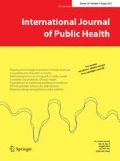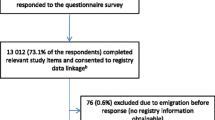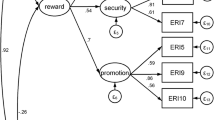Abstract
Objectives
The aim was to analyze the longitudinal effects of organizational injustice (OIJ) and effort–reward imbalance (ERI) on work ability, emotional role functioning and physical role functioning.
Methods
Longitudinal data with a two-year follow-up of people previously receiving sickness absence benefits were used for analyses. OIJ and ERI were included separately and mutually in logistic regression models. Effects were tested for additivity. All analyses were additionally performed stratified by sex. All models were adjusted for sociodemographics and neuroticism.
Results
1886 participants (44.5% men, mean age: 48 years) were included. When mutually adjusted, OIJ and ERI affected work ability, and OIJ affected emotional role functioning. In stratified analyses, OIJ affected all outcomes in women, and ERI affected work ability in men. Additive effects of OIJ and ERI were not identified.
Conclusions
OIJ and ERI are important risk factors of limited participation. People with experiences of health-related and work-related impairments are in need of reliable structures and just working conditions.

Similar content being viewed by others
References
Bethge M, Radoschewski FM (2012) Adverse effects of effort-reward imbalance on work ability: longitudinal findings from the German Sociomedical Panel of Employees. Int J Public Health 57:797–805
Bethge M, Radoschewski FM, Gutenbrunner C (2012) Effort-reward imbalance and work ability: cross-sectional and longitudinal findings from the Second German Sociomedical Panel of Employees. BMC Public Health 12:875
Bethge M, Spanier K, Neugebauer T, Mohnberg I, Radoschewski FM (2015) Self-reported poor work ability-an indicator of need for rehabilitation? A cross-sectional study of a sample of German employees. Am J Phys Med Rehabil 94:958–966
Bourbonnais R, Brisson C, Vezina M (2011) Long-term effects of an intervention on psychosocial work factors among healthcare professionals in a hospital setting. Occup Environ Med 68:479–486
Dragano N, Wahrendorf M, Müller K, Lunau T (2016) Work and health inequalities: the unequal distribution of exposures at work in Germany and Europe. Bundesgesundheitsbla 59:217–227
Elovainio M, Kivimäki M, Vahtera J (2002) Organizational justice: evidence of a new psychosocial predictor of health. Am J Public Health 92:105–108
Elovainio M, Kivimäki M, Vahtera J, Virtanen M, Keltikangas-Järvinen L (2003) Personality as a moderator in the relations between perceptions of organizational justice and sickness absence. J Vocat Behav 63:379–395
Ferrie JE, Head J, Shipley MJ, Vahtera J, Marmot MG, Kivimaki M (2006) Injustice at work and incidence of psychiatric morbidity: the Whitehall II study. Occup Environ Med 63:443–450
Hayashi T, Odagiri Y, Takamiya T, Ohya Y, Inoue S (2015) Organizational justice and insomnia: relationships between justice components and insomnia symptoms among private company workers in Japan. J Occup Health 57:142–150
Head J, Kivimaki M, Siegrist J, Ferrie JE, Vahtera J, Shipley MJ, Marmot MG (2007) Effort-reward imbalance and relational injustice at work predict sickness absence: the Whitehall II study. J Psychosom Res 63:433–440
Herr RM, Bosch JA, Loerbroks A, van Vianen AE, Jarczok MN, Fischer JE, Schmidt B (2015) Three job stress models and their relationship with musculoskeletal pain in blue- and white-collar workers. J Psychosom Res 79:340–347
Hjarsbech PU, Christensen KB, Bjorner JB, Madsen IEH, Thorsen SV, Carneiro IG, Christensen U, Rugulies R (2014) A multi-wave study of organizational justice at work and long-term sickness absence among employees with depressive symptoms. Scand J Work Environ Health 40:176–185
Hoven H, Siegrist J (2013) Work characteristics, socioeconomic position and health: a systematic review of mediation and moderation effects in prospective studies. Occup Environ Med 70:663–669
Ilmarinen J (2009) Work ability—a comprehensive concept for occupational health research and prevention. Scand J Work Environ Health 35:1–5
Inoue A, Kawakami N, Tsuno K, Tomioka K, Nakanishi M (2013) Organizational justice and major depressive episodes in Japanese employees: a cross-sectional study. J Occup Health 55:47–55
Inoue A, Kawakami N, Eguchi H, Miyaki K, Tsutsumi A (2015) Organizational justice and physiological coronary heart disease risk factors in Japanese employees: a cross-sectional study. Int J Behav Med 22:775–785
Ishtiak-Ahmed K, Perski A, Mittendorfer-Rutz E (2014) Risk markers of all-cause and diagnosis-specific disability pension—a prospective cohort study of individuals sickness absent due to stress-related mental disorders. BMC Public Health 14:805
Jaaskelainen A, Kausto J, Seitsamo J, Ojajarvi A, Nygard CH, Arjas E, Leino-Arjas P (2016) Work ability index and perceived work ability as predictors of disability pension: a prospective study among Finnish municipal employees. Scand J Work Environ Health 42:490–499
Jin WM, Zhang Y, Wang XP (2015) Job burnout and organizational justice among medical interns in Shanghai, People’s Republic of China. Adv Med Educ Pract 6:539–544
Juvani A, Oksanen T, Virtanen M, Elovainio M, Salo P, Pentti J, Kivimaki M, Vahtera J (2016) Organizational justice and disability pension from all-causes, depression and musculoskeletal diseases: a Finnish cohort study of public sector employees. Scand J Work Environ Health 42:395–404
Kivimaki M, Ferrie JE, Hagberg J, Head J, Westerlund H, Vahtera J, Alexanderson K (2007) Diagnosis-specific sick leave as a risk marker for disability pension in a Swedish population. J Epidemiol Community Health 61:915–920
Kivimäki M, Vahtera J, Elovainio M, Virtanen M, Siegrist J (2007) Effort-reward imbalance, procedural injustice and relational injustice as psychosocial predictors of health: complementary or redundant models? Occup Environ Med 64:659–665
Knol MJ, VanderWeele TJ, Groenwold RH, Klungel OH, Rovers MM, Grobbee DE (2011) Estimating measures of interaction on an additive scale for preventive exposures. Eur J Epidemiol 26:433–438
Kurioka S, Inoue A, Tsutsumi A (2014) Optimum cut-off point of the Japanese short version of the effort-reward imbalance questionnaire. J Occup Health 55:340–348
Lang FR, Lüdtke O, Schupp J, Wagner GG (2011) Short assessment of the Big Five: robust across survey methods except telephone interviewing. Behav Res Methods 43:548–567
Linton SJ, Kecklund G, Franklin KA, Leissner LC, Sivertsen B, Lindberg E, Svensson AC, Hansson SO, Sundin O, Hetta J, Bjorkelund C, Hall C (2015) The effect of the work environment on future sleep disturbances: a systematic review. Sleep Med Rev 23:10–19
Little R, Rubin D (2002) Statistical analysis with missing data. Wiley, Hoboken
Loerbroks A, Meng H, Chen ML, Herr R, Angerer P, Li J (2014) Primary school teachers in China: associations of organizational justice and effort-reward imbalance with burnout and intentions to leave the profession in a cross-sectional sample. Int Arch Occup Environ Health 87:695–703
Loerbroks A, Cho SI, Dollard MF, Zou J, Fischer JE, Jiang Y, Angerer P, Herr RM, Li J (2016) Associations between work stress and suicidal ideation: individual-participant data from six cross-sectional studies. J Psychosom Res 90:62–69
Lund T, Kivimaki M, Labriola M, Villadsen E, Christensen KB (2008) Using administrative sickness absence data as a marker of future disability pension: the prospective DREAM study of Danish private sector employees. Occup Environ Med 65:28–31
Martinez MC, do Rosario Dias de Oliveira Latorre M, Fischer FM (2015) A cohort study of psychosocial work stressors on work ability among Brazilian hospital workers. Am J Ind Med 58:795–806
Moorman RH (1991) Relationship between organizational justice and organizational citizen behaviour: does fairness perception influence employee citizenship? J Appl Psychol 76:845–855
Ndjaboué R, Brisson C, Vénzina M (2012) Organisational justice and mental health: a systematic review of prospective studies. Occup Environ Med 69:694–700
Rothman KJ (1976) The estimation of synergy or antagonism. Am J Epidemiol 103:506–511
Royston P, White I (2011) Multiple imputation by chained equations (MICE): implementation in Stata. J Stat Softw 45:2–20
Rugulies R, Aust B, Madsen IEH (2016) Effort-reward imbalance and affective Disorders. In: Siegrist J, Wahrendorf M (eds) Work stress and health in a globalized economy: the model of effort-reward imbalance. Springer International Publishing, Cham, pp 103–143
Shi J, Lei W, Wang M, Lin H (2009) Linking the Big Five personality constructs to organizational justice. Soc Behav Personal 37:209–222
Siegrist J, Li J (2016) Associations of extrinsic and intrinsic components of work stress with health: a systematic review of evidence on the effort-reward imbalance model. Int J Environ Res Public Health 13:432
Siegrist J, Wege N, Puhlhofer F, Wahrendorf M (2009) A short generic measure of work stress in the era of globalization: effort-reward imbalance. Int Arch Occup Environ 82:1005–1013
Spanier K, Radoschewski FM, Gutenbrunner C, Bethge M (2014) Direct and indirect effects of organizational justice on work ability. Occup Med (Lond) 64:638–643
Unrath M, Zeeb H, Letzel S, Claus M, Escobar Pinzon LC (2012) The mental health of primary care physicians in Rhineland-Palatinate, Germany: the prevalence of problems and identification of possible risk factors. Deutsches Ärzteblatt Int 109:201–207
Vlasveld MC, van der Feltz-Cornelis CM, Anema JR, van Mechelen W, Beekman AT, van Marwijk HW, Penninx BW (2013) The associations between personality characteristics and absenteeism: a cross-sectional study in workers with and without depressive and anxiety disorders. J Occup Rehabil 23:309–317
Wallman T, Wedel H, Palmer E, Rosengren A, Johansson S, Eriksson H, Svardsudd K (2009) Sick-leave track record and other potential predictors of a disability pension. A population based study of 8,218 men and women followed for 16 years. BMC Public Health 9:104
Ware JE Jr, Sherbourne CD (1992) The MOS 36-item short-form health survey (SF-36). I. Conceptual framework and item selection. Med Care 30:473–483
Ybema JF, van der Meer L, Leijten FR (2016) Longitudinal relationships between organizational justice, productivity loss, and sickness absence among older employees. Int J Behav Med 23:645–654
Acknowledgements
The GSPE-III and this research have been funded through the Federal German pension insurance (Az. 8011-106-31/31.104.1).
Author information
Authors and Affiliations
Corresponding author
Ethics declarations
Funding
The study was funded by the Federal German Pension Insurance (Award number: 8011-106-31/31.104.1).
Conflict of interest
The authors declare that they have no competing interests.
Ethical approval
The study protocol was approved by the ethics committee of the Hannover Medical School (ethics vote no. 1730-2013) and the data protection commissioner of the Federal German Pension Insurance.
Rights and permissions
About this article
Cite this article
Spanier, K., Michel, E., Peters, E. et al. Injustice at work affects work ability and role functioning: findings of a cohort study. Int J Public Health 63, 447–456 (2018). https://doi.org/10.1007/s00038-017-1056-4
Received:
Revised:
Accepted:
Published:
Issue Date:
DOI: https://doi.org/10.1007/s00038-017-1056-4




